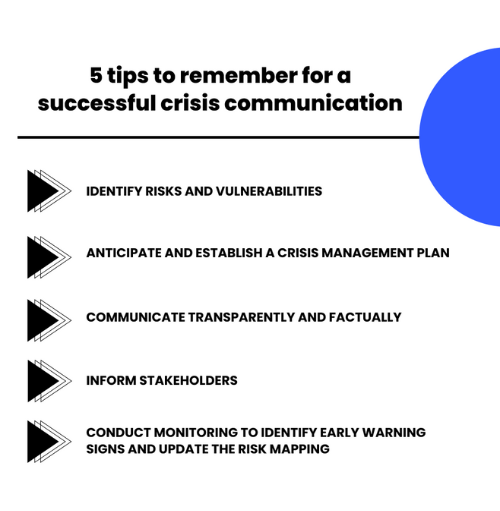What is good crisis communication?
Crises can strike any business at any time, whether it's a data breach, human error, or any other unforeseen situation. "Effective crisis management is primarily about preventing a deterioration of the situation," says Fabienne Laurenceau, director of the Limpeed agency, specialized in crisis communication."Everything must be done to maintain trust with the brand in relation to stakeholders and the general public," says Vincent Prevost, director of the communication consultancy agency Opinion Valley. In such situations, communication is crucial to minimize the negative impacts of the crisis on an organization's credibility.
"The essence of crisis communication is not necessarily managing the heat of the moment."
In the digital age, organizations must be ready to respond to crises quickly. According to Fabienne Laurenceau, crisis communication has evolved over the years to become more proactive. "The question is not whether it will happen to us, but when it will happen. With the immediacy and event-driven nature of information, social networks have become amplifiers of both the good and the bad," she states."No one is immune to a crisis," emphasizes the communication expert. That's why it is crucial to anticipate. Vincent Prevost confirms, "The essence of crisis communication is not necessarily managing the heat of the moment but preparing in advance." The director of Opinion Valley knows that in a crisis, communication is a race against time. "Examples of good crisis communication often involve companies that had established preparation processes," he analyzes.
The essential steps of successful crisis communication
Even though anticipation is a fundamental element of their profession, it is not always straightforward when the crisis has not yet occurred.For Vincent Prevost, the first step is to map out the risks and evaluate them. "This analysis must include all risks, even those not initially imagined. That's why all internal and external stakeholders must be considered," he emphasizes.
When the crisis is declared, Fabienne Laurenceau recommends thoroughly analyzing the context before making any statements. "It is essential to understand the logic of the crisis, identify the constraints or opportunities for potential communication, and keep in mind that current events can influence public perception."
According to the experts, communication has become indispensable. Even if at times, some actors may prefer discretion, "remaining hidden, waiting for the storm to pass," as Vincent Prevost mentions. “Often, failed crisis communication examples result from a reluctance to communicate and a desire to conceal the crisis. However, today, it is no longer possible; there is a greater public expectation for transparency, especially from organizations.”
"In a caricatural sense, crisis communication does not work miracles," reveals the communication expert. According to him, crisis management reaches its limits when its primary goal is to bypass a problem. "Simply trying to divert attention doesn't work. You always need to rely on an action plan. We can't rewrite history," adds Fabienne Laurenceau. "But we can support the company in coming out of the crisis.”
The Press Release: An Effective Ally in Crisis Management
To accompany the resolution of a crisis, the press release maintains an essential role. "It allows for conveying messages and framing media relations in time and space," explains the director of Limpeed. Without making too much noise, the press release has the ability to formalize a message and demonstrate an understanding of the situation.
When used effectively, the press release enables maintaining control over one's image, according to Vincent Prevost. "It is a credible source that must be continuously updated throughout a crisis. Initially, press releases are very brief, and as time goes on, they can be expanded."
The two experts highlight five key criteria for an effective press release in a crisis situation. It should be:
• Simple
• Concise
• Neutral
• Factual with an empathetic message

Randa El Fekih

